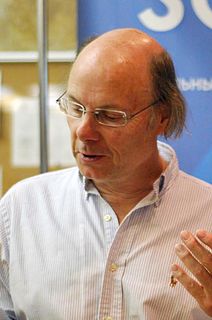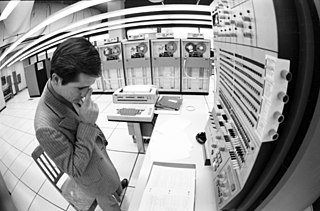Related Research Articles

Bjarne Stroustrup is a Danish computer scientist, most notable for the creation and development of the C++ programming language. He is a visiting professor at Columbia University, and works at Morgan Stanley as a Managing Director in New York.
In computing and computer programming, exception handling is the process of responding to the occurrence of exceptions – anomalous or exceptional conditions requiring special processing – during the execution of a program. In general, an exception breaks the normal flow of execution and executes a pre-registered exception handler; the details of how this is done depend on whether it is a hardware or software exception and how the software exception is implemented. Exception handling, if provided, is facilitated by specialized programming language constructs, hardware mechanisms like interrupts, or operating system (OS) inter-process communication (IPC) facilities like signals. Some exceptions, especially hardware ones, may be handled so gracefully that execution can resume where it was interrupted.
The A-0 system, written by Grace Murray Hopper in 1951 and 1952 for the UNIVAC I, was an early compiler related tool developed for electronic computers. The A-0 functioned more as a loader or linker than the modern notion of a compiler. A program was specified as a sequence of subroutines and its arguments. The subroutines were identified by a numeric code and the arguments to the subroutines were written directly after each subroutine code. The A-0 system converted the specification into machine code that could be fed into the computer a second time to execute the said program.

Malcolm Douglas McIlroy is a mathematician, engineer, and programmer. As of 2019 he is an Adjunct Professor of Computer Science at Dartmouth College. McIlroy is best known for having originally proposed Unix pipelines and developed several Unix tools, such as spell, diff, sort, join, graph, speak, and tr. He was also one of the pioneering researchers of macro processors and programming language extensibility. He participated in the design of multiple influential programming languages, particularly PL/I, SNOBOL, ALTRAN, TMG and C++.
A big ball of mud is a software system that lacks a perceivable architecture. Although undesirable from a software engineering point of view, such systems are common in practice due to business pressures, developer turnover and code entropy. They are a type of design anti-pattern.

The history of programming languages spans from documentation of early mechanical computers to modern tools for software development. Early programming languages were highly specialized, relying on mathematical notation and similarly obscure syntax. Throughout the 20th century, research in compiler theory led to the creation of high-level programming languages, which use a more accessible syntax to communicate instructions.
ObjVlisp is a 1984 object-oriented extension of Vlisp–Vincennes LISP, a LISP dialect developed since 1971 at the University of Paris VIII – Vincennes. It is noteworthy as one of the earliest implementations of the concept of metaclasses, and in particular explicit metaclasses. In the ObjVlisp model, "each entity is an instance of a single class. Classes are instances of other classes, called metaclasses. This model allows for extension of the static part of OOL, i.e. the structural aspects of objects considered as implementation of abstract data types"
SIGPLAN is the Association for Computing Machinery's Special Interest Group on programming languages.
Extensible programming is a term used in computer science to describe a style of computer programming that focuses on mechanisms to extend the programming language, compiler and runtime environment. Extensible programming languages, supporting this style of programming, were an active area of work in the 1960s, but the movement was marginalized in the 1970s. Extensible programming has become a topic of renewed interest in the 21st century.

Alexander Alexandrovich Stepanov is a Russian-American computer programmer, best known as an advocate of generic programming and as the primary designer and implementer of the C++ Standard Template Library, which he started to develop around 1992 while employed at HP Labs. He had earlier been working for Bell Labs close to Andrew Koenig and tried to convince Bjarne Stroustrup to introduce something like Ada generics in C++. He is credited with the notion of concept.
FORMAC, the FORmula MAnipulation Compiler, was the first computer algebra system to have significant use. It was developed by Jean E. Sammet and her team, as an extension of FORTRAN IV. The compiler was implemented as a preprocessor taking the FORMAC program and converting it to a FORTRAN IV program which was in turn compiled without further user intervention.
The Laning and Zierler system was one of the first operating algebraic compilers, that is, a system capable of accepting mathematical formulas in algebraic notation and producing equivalent machine code. It was implemented in 1952 for the MIT WHIRLWIND by J. Halcombe Laning and Neal Zierler. It is preceded by the UNIVAC A-2, IBM Speedcoding and a number of systems that were proposed but never implemented.
Jean E. Sammet was an American computer scientist who developed the FORMAC programming language in 1962. She was also one of the developers of the influential COBOL programming language.
Brent Hailpern is a computer scientist retired from IBM Research. His research work focused on programming languages, software engineering, and concurrency.

David Michael Ungar, an American computer scientist, co-created the Self programming language with Randall Smith. The SELF development environment's animated user experience was described in the paper Animation: From Cartoons to the User Interface co-written with Bay-Wei Chang, which won a lasting impact award at the ACM Symposium on User Interface Software and Technology 2004.
William Randall Cook was an American computer scientist, who was an associate professor in the Department of Computer Sciences at the University of Texas at Austin.

David A. Moon is a programmer and computer scientist, known for his work on the Lisp programming language, as co-author of the Emacs text editor, as the inventor of ephemeral garbage collection, and as one of the designers of the Dylan programming language. Guy L. Steele Jr. and Richard P. Gabriel (1993) name him as a leader of the Common Lisp movement and describe him as "a seductively powerful thinker, quiet and often insulting, whose arguments are almost impossible to refute".
References
- 1 2 3 Ali & Smith 2014, p. 116.
- ↑ Bairstow 2010, p. 76.
- ↑ https://hopl4.sigplan.org
- ↑ HOPL IV. "HOPL IV List of Accepted Papers" . Retrieved 29 February 2020.
- ↑ ACM (June 2020). "Proceedings of the ACM on Programming Languages" . Retrieved 12 June 2020.
- Ali, Azad; Smith, David T. (2014). Blakey, Peter (ed.). "A debate over the teaching of a legacy programming language in an information technology (IT) program". Journal of Information Technology Education.Innovations in Practice. 13: 111–127. doi:10.28945/2088.
- Bairstow, Jeffrey (July 2010). "The sayings of rear admiral grace murray hopper, USN" . Laser Focus World. Vol. 46 no. 7. p. 76. Retrieved 14 January 2022– via ProQuest.